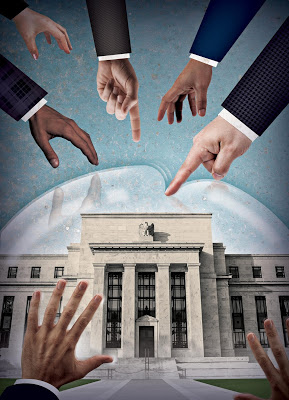The Federal Reserve sounded more dovish than many expected and this prompted a 5-7 bp drop in US rates, and the dollar fell to new lows for the week against many of the major currencies. The median Fed forecast now anticipates no hike this year but one next year. The Fed will also taper the roll-off of its balance sheet and completing it by the end of September. In December, 11 officials anticipated two or three hikes this year. Now only six see one or two hikes being necessary this year. The Fed’s economic assessment was downgraded. It recognized that the economy slowed in Q1 from a “solid” Q4 18. It acknowledged weakness in consumption and business investment. It stuck by its view that the economic expansion is
Topics:
Marc Chandler considers the following as important: 4) FX Trends, CAD, EUR, Featured, FOMC, JPY, newsletter, USD
This could be interesting, too:
Nachrichten Ticker - www.finanzen.ch writes Die Performance der Kryptowährungen in KW 9: Das hat sich bei Bitcoin, Ether & Co. getan
Nachrichten Ticker - www.finanzen.ch writes Wer verbirgt sich hinter der Ethereum-Technologie?
Martin Hartmann writes Eine Analyse nach den Lehren von Milton Friedman
Marc Chandler writes March 2025 Monthly
 The Federal Reserve sounded more dovish than many expected and this prompted a 5-7 bp drop in US rates, and the dollar fell to new lows for the week against many of the major currencies. The median Fed forecast now anticipates no hike this year but one next year. The Fed will also taper the roll-off of its balance sheet and completing it by the end of September.
The Federal Reserve sounded more dovish than many expected and this prompted a 5-7 bp drop in US rates, and the dollar fell to new lows for the week against many of the major currencies. The median Fed forecast now anticipates no hike this year but one next year. The Fed will also taper the roll-off of its balance sheet and completing it by the end of September.
In December, 11 officials anticipated two or three hikes this year. Now only six see one or two hikes being necessary this year. The Fed’s economic assessment was downgraded. It recognized that the economy slowed in Q1 from a “solid” Q4 18. It acknowledged weakness in consumption and business investment. It stuck by its view that the economic expansion is most likely to continue with inflation near target.
However, the median forecast now expects that the interest rate cycle will be completed without the Fed being able to raise the fed funds target range to its long-term equilibrium rate. In effect, they judge the economy as still requiring monetary support.
The median forecast shaved this year’s GDP to 2.1% from 2.3% and next year to 1.9% from 2.0%. The forecast for 2021 was unchanged at 1.8%. Long-term growth is estimated at 1.9%. This is the disconnect: An economy expected to grow above trend but still requires easy monetary policy.
Unemployment forecast was tweaked higher (3.7% this year from 3.5% and 3.8% next year from 3.6%, reaching 3.9% instead of 3.8% in 2012. The long-run rate-full employment is estimated at 4.3% rather than 4.4%. Still, Powell noted that trend jobs growth may have “stepped down.” The headline PCE deflator was shaved 0.1% to 1.8% this year, 2.0% in 2020 and 2021. Market measures of inflation expectations are at lower levels while surveys are mostly steady.
The euro has powered through the recent highs and the downtrend line from the January and February highs. It was found today around $1.1375. The euro is poised to test the upper end of the trading range that has captured most of the price action in recent months ($1.13-$1.15). The dollar initially rose above yesterday’s highs and now is trading below yesterday’s lows. This technical reversal warns of potential losses toward JPY110. Sterling is underperforming as Brexit uncertainty holds it back. The Fed’s dovishness saw the Canadian dollar jump and returned to yesterday’s best levels.
The 10-year yield closed below 2.60% last week and now is set to test 2.50% and is at its lowest level since Q1 18. The two-year yield is near 2.38%, a seven basis point drop. It leaves the yield just shy of the current average effective Fed funds rate (2.41%).
Tags: #USD,$CAD,$EUR,$JPY,Featured,FOMC,newsletter
